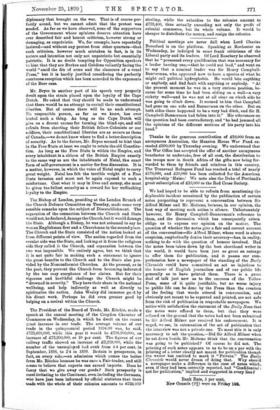We had hoped to be able to refrain from mentioning
the deplorable incident occasioned by the publication of certain notes purporting to represent a conversation between Sir Alfred Milner and Mr. Molten°, because, in our opinion, the best way of meeting such action is silence. Unfortunately however, Sir Henry Campbell-Bannerman's reference to them, and the discussion which has consequently arisen oblige us to express our opinion on the matter. The question of whether the notes give a fair and correct account of the conversation—Sir Alfred Milner, whose word is above suspicion, emphatically denies their accuracy—has, in reality, nothing to do with the question of honour involved. Had the notes been taken down by the best shorthand writer in the world, it would have been just as great an outrage to offer them for publication, and it passes our com- prehension how a newspaper of the standing of the Daily Chronicle could have committed an act so injurious to the honour of English journalism and of our public life generally as to have printed them. There is a great deal of talk just now as to the excesses of the Yellow Press, some of it quite justifiable, but no worse injury to public life can be done by the Press than the creation of the feeling that words uttered in conversation, and obviously not meant to be reported and printed, are not safe from the risk of publication in respectable newspapers. We notice with satisfaction the statement of the Daily News that the notes were offered to them, but that they were refused on the ground that the notes had not been submitted to Sir Alfred Milner nor received his endorsement. It is urged, we see, in extenuation of the act of publication that the interview was not a private one. To meet this it is only necessary to ask the question,—Did Sir Alfred Milner when he sat down beside Mr. Molteno think that the conversation was going to be published ? Of course he did not. The printing of such notes appears to us to be on a par with the printing of a letter clearly not meant for publication though the writer has omitted to mark it "Private." The Daily Chronicle would never dream of doing that. Why should a newspaper make a difference in the case of notes which, even if they had been correctly reported, had " Confidential : not for publication," implied and suggested in every line










































 Previous page
Previous page